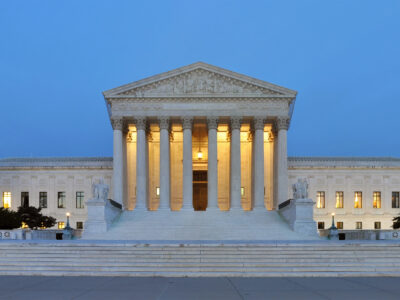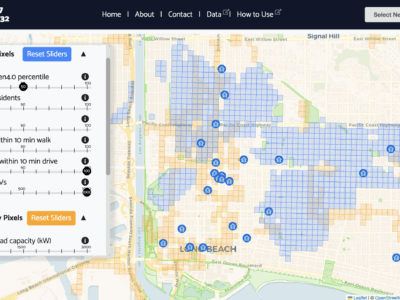A red-letter day for washing machines
 Under the Bush administration, which was implacably hostile to state environmental regulations exceeding federal minimum requirements, the Department of Energy refused to consider California’s request for permission to issue state rules setting water efficiency standards for washing machines. The Ninth Circuit has now set aside that action as arbitrary and capricious, and ruled that DOE must reconsider California’s request. That likely means that California’s rules will eventually take effect, but several years later than they should have.
Under the Bush administration, which was implacably hostile to state environmental regulations exceeding federal minimum requirements, the Department of Energy refused to consider California’s request for permission to issue state rules setting water efficiency standards for washing machines. The Ninth Circuit has now set aside that action as arbitrary and capricious, and ruled that DOE must reconsider California’s request. That likely means that California’s rules will eventually take effect, but several years later than they should have.
Does it matter whether California can regulate the water efficiency of washing machines? More than you might think. California’s 2002 statute directing the California Energy Commission to set water efficiency standards was supported by a finding that washing machines account for a whopping 22% of average household water use. (If that seems too high, consider that the joint DOE/EPA Energy Star program assumes an average of 392 loads per per household per year.)
According to the Ninth Circuit, California asserted that its washing machine standards, when fully implemented, would produce annual water savings sufficient to supply a city the size of San Diego. That’s critically important in California, where water is chronically short and the water use cycle (transporting, supplying, treating, and disposing of water) is responsible for nearly 20% of electricity use.
The federalism of appliance efficiency standards is complex. The federal Energy Policy and Conservation Actpreempts the adoption of state standards for energy or water use of any product covered by federal energy efficiency standards. There are federal standards for energy use by washing machines, but the federal standards don’t cover water use because DOE concluded (at the tail end of the Clinton administration), that it lacked authority to issue water use standards.
EPCA allows DOE to waive preemption if state regulations are “needed to meet unusual and compelling State or local energy or water interests.” 42 U.S.C. § 6297(d). The statute requires that the state show both that its interests “are substantially different in nature or magnitude than those prevailing in the United States generally,” and that the regulation it seeks to adopt is preferable to “alternative approaches to energy or water savings or production, including reliance on reasonably predictable market-induced improvements in efficiency.”
No waiver may be issued if opponents of the state regulation show that it “will significantly burden manufacturing, marketing, distribution, sale, or servicing of the covered product on a national basis,”or “is likely to result in the unavailability in the State of any covered product type (or class) of performance characteristics (including reliability), features, sizes, capacities, and volumes that are substantially the same as those generally available in the State at the time of the Secretary’s finding. State rules cannot go into effect sooner than 3 years after the waiver is formally approved.
California sought a waiver late in 2005, shortly after it completed its regulations. A year later, DOE denied the petition. California sought review of that decision in the Ninth Circuit. After first determining that California was not required to seek review in the District Court, the Ninth Circuit ruled that DOE had not adequately considered California’s request.
A quick scan of the opinion shows just how determined the Bush DOE was to prevent any state regulation. DOE justified denial of the waiver on three grounds: (1) California’s rules, the first phase of which were to be implemented at the beginning of 2007, did not provide the statutorily required three years lead time, as of DOE’s December 2006 ruling on the waiver request; (2) California didn’t show exactly where in the administrative record it had shown that its regulations were preferable to alternative approaches; and (3) that adoption of the proposed regulations would make top-loading washers unavailable in California.
The Ninth Circuit rejected each of these arguments in turn. It concluded that: (1) DOE could have delayed approval of the state regulations for three years, or allowed the second phase (scheduled to begin in 2010) to go into effect without the first phase; (2) California had provided enough information to enable DOE to evaluate the waiver request against the statutory standards, as demonstrated by DOE’s acceptance of California’s submission as complete in 2005; and (3) that DOE had not evaluated the competing evidence on top-loading washers, instead simply accepting opponents’ assertion that none would be available.
California asked the court to order DOE to grant its waiver request, but the court was not willing to go that far. Having found that DOE had, in effect, never fully evaluated the request, the court decided that the remedy was to remand to DOE for a fresh look. Under the Obama administration, of course, that look is far more likely to result in a determination that the state has regulatory authority. For all its rhetoric of state’s rights, the Bush administration never believed those should apply to state decisions to impose strong environmental regulations. As demonstrated by its grant of California’s request for authority to implement automobile greenhouse gas emission regulations, the Obama administration is much more sympathetic to state autonomy on the environmental regulation front.
Expect a positive ruling from DOE on this one, and expect California’s rules to drive general improvements in washing machine water use efficiency. Better late than never.
Hat tip: LA Times Greenspace blog.
Reader Comments
One Reply to “A red-letter day for washing machines”
Comments are closed.







interesting posting — and the coolest picture of a refrigerator I’ve ever seen.